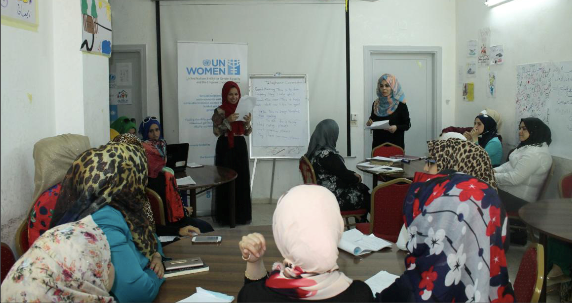UN Women foster the economic participation of women living in marginalized areas in Irbid and Zarqa
UN Women foster the economic participation of women living in marginalized areas in Irbid and Zarqa

Picture: 10 April 2016, Zarqa. Woman introducing herself in English as part of the English language training module
UN Women is working to provide support and services to those living in Jordanian host communities, while also tackling key issues of gender equality and women’s empowerment. To this end UN Women has a robust livelihoods and economic empowerment programme that seeks to place Jordanian women – with a focus on young women - from under served and marginalised areas into decent employment opportunities, enabled through generous funding from the Governments of Finland, Italy and Japan.
With the objective of increasing women’s role in the labour market, UN Women’s work in this area aims to enhance women and girls’ employability in the private sector and to promote long-term positive changes in earning partners – as well as the attitudes, confidence, and self-esteem of those it engages.
To this end, UN Women’s programming, directly engages the private sector and Jordanian women between the ages of 18 and 26 who are living in targeted poverty pockets in Mafraq, Irbid and Zarqa. In its engagement with the private sector, UN Women signs commitment letters through which companies agree to hire a certain number of Jordanian women, if they have successfully completed workplace success and on the job training.
The services provided to job seekers are holistic. Programme participants then receive training in both hard and soft skills – modules on life skills and soft skills include subjects such as workplace success, political engagement, gender-based violence and the English language. Alongside this, the women are provided with on-the-job technical skills training in a range of issues – skills related to the garment industry, tourism data entry and secretarial work. These are concluded with job fairs, where women are matched with private sector employers.
Within the garment industry project, the target was to place at least 115 women in factories in the garment industry, JEFE have accomplished this by placing 116 women from Mafraq, Zarqa and Irbid in the identified factories. The women are earning the minimum wage which is 190 JODs with additional bonuses each week depending on their attained target. They are also provided with transportation. Another 300 women from Irbid and Zarqa are currently enrolled in capacity building and training process for tourism data entry and secretarial work sector and it is expected to replace 70% of them in the job market by July 2016.
Participants have reflected positively on the program – it has helped them to develop skillsets, but also to become more aware and resilient. Bara’a Al Jarah, a participant in the Data Entry and Secretary Training in Zarqa, tells us:
“I have learned a lot from the Data Entry and Secretary Training with support from UN WOMEN. I have realized my rights and duties as an employee, I’m now aware of women’s rights which protect women from any problems that she might encounter. I have also learned how to turn the difficulties I face as a woman into opportunities”
Also there is a positive attitude for girls who are already replaced in working position on their personal and social lives. Malak Mohammad, a participant in the garment industry project, shares with us:
“Since I started working in the factory I felt more empowered and independent. The environment in the factory is very comfortable and friendly which made it a lot easier for me to adjust. Although we are getting paid the minimum wage, however I believe that starting from anywhere does really make a difference.” She also mentioned that “the management are very supportive and encouraging, they really want to see us excel and succeed”.